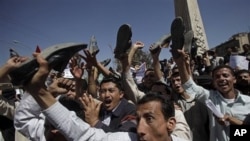More than 1,000 Yemeni students demonstrated Sunday in Sana'a, the capital, continuing more than a week of rallies demanding the departure of President Ali Abdullah Saleh.
Nearby, at least 50 Saleh supporters held a pro-government demonstration. In previous days, several people were hurt during clashes between the rival sides despite calls by Saleh urging dialogue between his ruling party and the opposition.
The president told reporters Sunday that dialogue is the best means of settling differences, not sabotage or cutting off roads.
Saleh has already pledged that neither he nor his son will seek the presidency after the long-time ruler's term expires in 2013. Saleh has been in office since 1978.
Anti-Saleh demonstrators have also denounced what they say is systematic oppression and widespread corruption. On Saturday, one person was killed and five were wounded in clashes in several cities between protesters, government supporters and Yemeni security forces.
In a separate development, police arrested the leader of Yemen's secessionist Southern Movement. Hassan Baoum was detained Sunday at a hospital where he was undergoing medical treatment in the port city of Aden. Baoum has been the main organizer of secessionist protests in recent months. He was previously arrested last November.
Southern and northern Yemen once were two separate nations. They united in 1990, and Saleh, who had led the former Yemen Arab Republic in the north, has been head of state since then.
Despite its political unification, Yemen is one of the world's poorest nations. Even before the recent protests, the country was beset by internal conflicts involving southern secessionists, northern rebels and al-Qaida insurgents.
Some information for this report was provided by AP, AFP and Reuters.




